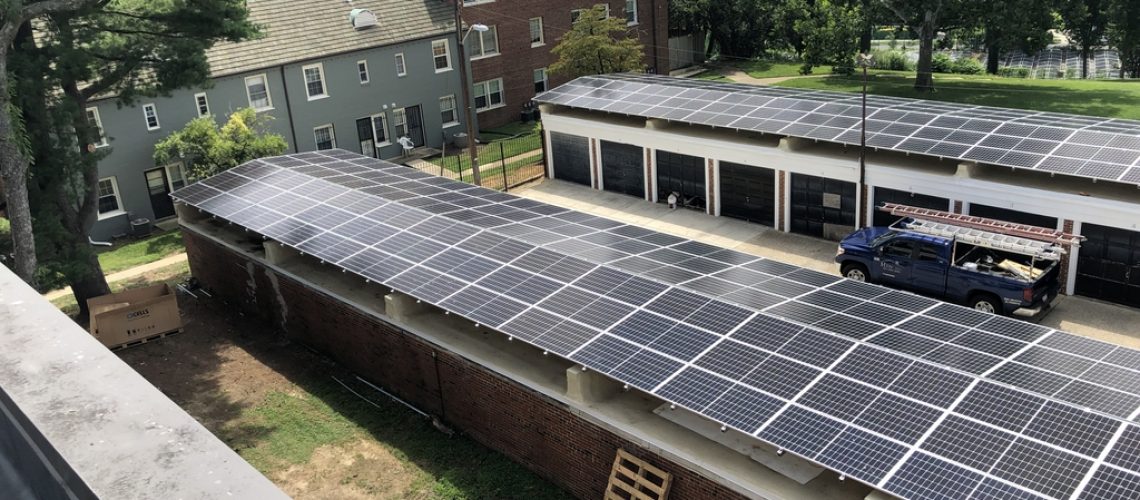When complete, the non-profit group will have more than 3,000 housing units with installed solar systems.
A national non-profit group formed by iconic affordable housing advocate James W. Rouse in 1982 has turned its attention to rooftop solar accessibility.
Enterprise Community Partners, a Washington, D.C. -based affordable housing group which has invested $54 billion to date to create 873,000 affordable homes, this week partnered with the DC Green Bank to fund $12.4 million towards a 2.2 MW rooftop solar portfolio.
Enterprise will install rooftop and solar canopy systems at four affordable housing complexes in the metropolitan D.C. region. Funded by the Green Bank and Enterprise’s community development financial institution, the Enterprise community loan fund, the rooftop solar investment will bring solar to 536 households. Rooftop solar will be installed on Enterprise’s Arbor View and Randle Hill apartment communities in Ward 8. Additional solar carports and EV charging stations will be installed at The Overlook at Oxon Run in Ward 8 and Edgewood Commons in Ward 5.
Underscoring Enterprise’s commitment to ESG investing, solar panels used across its D.C. buildings are expected to eliminate greenhouse gas emissions equivalent to 1,794 tons of carbon dioxide each year. Over time a new community solar program will be offered to residents, providing subscribers a 25% discount on their electric bills. Enterprise Community Development, working with local community providers and installer Prospect Solar, will also offer a complete workforce development program to residents interested in a career in solar energy.
The announcement marks the second phase of a long-term effort to install solar panels across Enterprise Community Development’s entire building portfolio. When complete, more than 3,000 housing units will benefit from solar power.
The solar investment is being supported by Solar Revenue Put production insurance from kWh Analytics, enabling Enterprise to deploy more capital with lower financing risk.
“Solar energy allows us to reduce our overall carbon footprint, lower energy costs and put money back in residents’ pockets all at the same time. It’s a win-win-win,” said Brian McLaughlin, president of Enterprise Community Development. “Access to renewable energy should not be determined by income level.”
Within the Inflation Reduction Act, the Greenhouse Gas Reduction Fund provides $7 billion in government funding to low-income and disadvantaged communities who deploy clean energy resources, including distributed technologies on residential rooftops. Under the GGRF, an additional $19.97 billion in awards is also available to qualified projects that reduce or avoid greenhouse gas emissions and other forms of air pollution, with $8 billion of that funding group carved out for low-income and disadvantaged communities.
“The IRA is a gamechanger that will unleash tens of billions of dollars for direct investment in communities, and hundreds of billions more in tax and financial incentives,” Jean Nelson-Houpert, interim chief executive officer of the DC Green Bank, told pv magazine USA. “We stand ready to ensure that D.C. gets its fair share of these resources and that we harness them to support the delivery of clean, affordable, and renewable solar energy that prioritizes disadvantaged communities.”
The DC Green Bank funds solar energy, energy efficiency and building retrofits, as well as stormwater infrastructure, and EV charging systems across the DC region. In 2022, the Green Bank issued $26 million in capital, a record year compared to $3 million and $2 million issued in 2021 and 2020, respectively. Approximately eight of the Bank’s 20 total FY 2022 loan transactions financed solar projects.
To date the Green Bank has funded 18 solar rooftop projects in Ward 8 and seven rooftop solar projects in Ward 5, where Enterprise will deploy 2.2 MW of new installations.
In May 2022, the Green Bank teamed up with solar developer PosiGen on a $7 million transaction to install 300 residential solar projects across the District for low-to-moderate income (LMI) residents, including houses in Ward 5 and 8. A month later, the Green Bank partnered with Howard University and Volt Energy to deploy 1.5 MW of solar resources in a $6 million deal to finance solar installations across the D.C. university’s campus, representing the largest solar deployment on a historically black college and university (HBCU) campus.
Founded in 1982 by James and Patty Rouse, Enterprise Community Partners is the the fifth largest non-profit housing provider in the US, which built 873,000 affordable homes in all 50 states, the District of Columbia and Puerto Rico.



